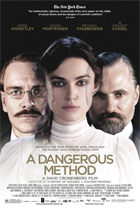A Dangerous Method
|  David Cronenberg has always evinced a fascination with the mind in his films, but over the past decade he has been particularly determined to move away from the physical body-horror that defined the first half of his career toward a more psychologically oriented cinema. Thus, it should come as little surprise that he has finally made a movie about psychiatry and psychiatrists. And not just any psychiatrists, mind you. In A Dangerous Method, which is based primarily on the stageplay The Talking Cure by Christopher Hampton, he takes on Carl Jung and Sigmund Freud, the two early-20th century geniuses who paved the road for modern psychiatry, and their relationship with Sabina Spielrein, whose contributions to psychoanalysis have typically been relegated to little more than a footnote in the history of psychiatry (this was first remedied by John Kerr’s 1993 book A Most Dangerous Method, which helped inspire Hampton’s play). David Cronenberg has always evinced a fascination with the mind in his films, but over the past decade he has been particularly determined to move away from the physical body-horror that defined the first half of his career toward a more psychologically oriented cinema. Thus, it should come as little surprise that he has finally made a movie about psychiatry and psychiatrists. And not just any psychiatrists, mind you. In A Dangerous Method, which is based primarily on the stageplay The Talking Cure by Christopher Hampton, he takes on Carl Jung and Sigmund Freud, the two early-20th century geniuses who paved the road for modern psychiatry, and their relationship with Sabina Spielrein, whose contributions to psychoanalysis have typically been relegated to little more than a footnote in the history of psychiatry (this was first remedied by John Kerr’s 1993 book A Most Dangerous Method, which helped inspire Hampton’s play).For those not well versed in the history of psychiatry and psychoanalysis, A Dangerous Method will still play as a mostly fascinating character study and depiction of the compelling power of ideas. While Cronenberg is typically known for the more shocking elements of his films, whether it be exploding heads in Scanners (1981) or characters who get off on auto wrecks in Crash (1996), here he has tamped down virtually all of his hallmarks to the point that he disappears almost entirely, which makes the film not terribly distinguishable from a well-mounted Merchant Ivory production from the 1990s. Granted, there are a few brief glimpses of Victorian-naughty sexuality, but otherwise the production is exceedingly modest in terms of scandal and focuses instead on the fraught relationships forged and broken between and among Jung, Freud, and Spielrein. We first meet Spielrein (Keira Knightley), the teenage daughter of Jewish-Russian immigrants, when she is being sent to the Burghölzli mental hospital near Zürich, where she is treated by Jung (Michael Fassbender) for hysteria. Jung employs the then-new and controversial psychoanalytic approach developed by Freud (Viggo Mortensen) with great success. Spielrein, a fiercely intelligent nonconformist whose interpersonal aggressiveness surprises and intrigues the reserved, button-down Jung, wants to become a psychiatrist herself. She becomes Jung’s student and then his lover, which conflicts with Jung’s ethical sense of self and drives a wedge between him and Freud, with whom he has been developing a collegial friendship based on the idea that he is Jung’s heir apparent. As played by Mortensen, Freud is a taciturn patriarch, dedicated completely to maintaining at all costs the orthodoxy of psychoanalysis (and its explanation of all psychosis via sexuality) and completely unforgiving of anything he views as a sin, either moral or professional. Fassbender plays Jung as a man constantly at war with himself, whether it be in response to the guilt he feels betraying his committed, aristocratic wife (Sarah Gadon) with Spielrein or his desire to engage in the kind of mythical and spiritual elements of human existence that Freud insists will sink the growing respectability of their profession. From a production standpoint, A Dangerous Method is impeccable in its evocation of the upper crusts of turn-of-the-20th-century European society; the cinematography by Peter Suschitzky, who has worked with Cronenberg on virtually all of his films since Dead Ringers (1988), has a lovely, painterly feel that is at its most powerful in the opening sequence when the hysterical Spielrein is being driven by thundering coach through the pastoral countryside to her institutionalization. From a Cronenbergian perspective, one would imagine that the film would dig deeper and more explicitly into some of the darker corners of that society, but the director is intent on focusing on rational minds at work, as Freud pulls as many strings as possible to maintain power, Jung battles with his own subjectivity, and Spielrein finds herself and uses her time with both men to elevate her status as one of the few female pioneers of psychoanalysis (her ideas about the links between sex and death would be extremely influential on Freud’s theories). In this respect, Knightley has the most difficult role, and she does an excellent job of playing all sides of Spielrein’s complex experience: from jaw-jutting psychosis in the early scenes, to a schoolgirl-like admiration for Jung and desire to emulate him, to a gradual sense of security that allows her to draw him in sexually and ultimately surpass him professionally and personally. Cronenberg has often been written off as a cool, detached visual sensationalist, and while that is true of some of his films (especially Crash), there are many others than have a genuine sense of heart and human pathos beneath all the viscera (his 1986 remake of The Fly being the preeminent example). A Dangerous Method sits somewhere between those two sides, as Cronenberg is so caught up with the characters’ minds that he sometimes loses track of their feelings. Yet, in the film’s final third he strikes on a vein of real feeling, eloquently depicting what the characters have both lost and gained over the years. And, even though the film as a whole could have benefited from a greater sense of passion, it remains a compelling experience and continued evidence of Cronenberg’s multifaceted fascinations with both the body and the mind. Copyright ©2012 James Kendrick Thoughts? E-mail James Kendrick All images copyright © Sony Pictures Classics |
Overall Rating: 

 (3)
(3)


